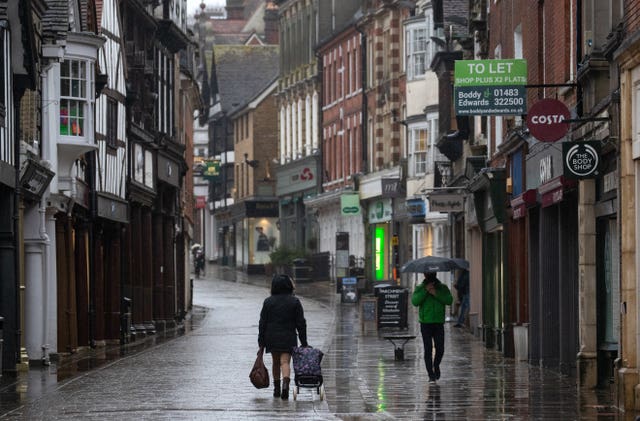Almost 190,000 retail jobs axed in high street turmoil since first lockdown
The devastating impact of the pandemic has resulted in 15,153 store closures in shopping destinations across the UK.

Almost 190,000 jobs have been lost in the retail bloodbath since shops were first forced to shut their doors a year ago, according to new figures.
In exclusive data for the PA news agency, the Centre for Retail Research has revealed that 188,685 retail jobs have vanished between the start of the first lockdown on March 23 2020 and March 31 this year.
The figures come less than two weeks before non-essential shops reopen their doors to customers in England after the lengthy third lockdown.
However, shoppers will visit high streets and town centres that have been hit hard by the pandemic, with thousands of stores shutting their doors for good.

The figures revealed that 83,725 jobs lost in the period were due to administrations, including major collapses by Debenhams and Sir Philip Green’s Arcadia Group.
Meanwhile, around 11,986 jobs were cut during Company Voluntary Arrangement (CVA) restructuring processes.
Another 92,974 jobs were axed through rationalisation programmes, which included supermarkets Sainsbury’s and Asda cutting thousands of roles.
The devastating impact of the pandemic resulted in 15,153 store closures in shopping destinations across the UK, the figures also revealed.
According to real estate adviser Altus Group, up to 401,690 shops are currently shuttered around the country and could reopen in the next stage of the Prime Minister’s road map out of lockdown.
Retail bosses have raised concerns that the high street will still be very challenging for retailers despite the easing of restrictions, as business rates payments return for many.
Robert Hayton, UK president of property tax at Altus, warned that the current business rates regime could bring further devastation.
He said: “Come July 1, large retailers in England will effectively be returned to full business rates liabilities, calculated by reference to rents being paid six years ago, bearing no resemblance to the here and now, with the fundamental right of appeal to seek valuation adjustments being retrospectively removed.”
A Government spokeswoman said: “We have continued to support the retail sector throughout the pandemic, including our new £5 billion Restart Grant scheme, extending the furlough scheme and the VAT cut, providing 750,000 businesses in retail and other sectors with business rates relief and a £350 billion package to support jobs and livelihoods.
“As we build back better from coronavirus we want to see our highstreets thrive. We have put in place an accelerated £1 billion Future High Streets Fund, a £4.8 billion Levelling Up Fund and are working with local leaders through the High Street Taskforce, all to support town centres, high street regeneration and drive growth across the UK.”
Meanwhile, Helen Dickinson, chief executive of the British Retail Consortium, said high streets will “absolutely” feature shops in future, but said the Government needs to act to bring down the burden of business rates.
She was asked about the reality of both chains and independent shops disappearing from high streets, and told BBC Breakfast: “That is a real thing and as I said that was a real thing that was happening before March 2020.
“And you know there are huge numbers of reasons behind that and one is this sort of shift to online which you were mentioning, and that is where there will be fewer shops in the future, but there absolutely will remain shops in high streets.
“But what we need to align behind is real reimagined town centres and high streets that include retail but that go beyond retail.”
Ms Dickinson said retail needs to be economic for people to operate, adding: “That’s where Government has a really vital role.
“People in retail, and in hospitality, anybody who operates commercial premises, always talks about business rates.
“So these are the taxes that are paid on shops, on restaurants, on coffee shops, and they have just become completely out of line with the economic reality of operating, and so the Government needs to act there to bring that burden down, and that will facilitate much more investment that we need to see to maintain local jobs in local communities and stop those boarded-up shops and restaurants up and down the country.”





